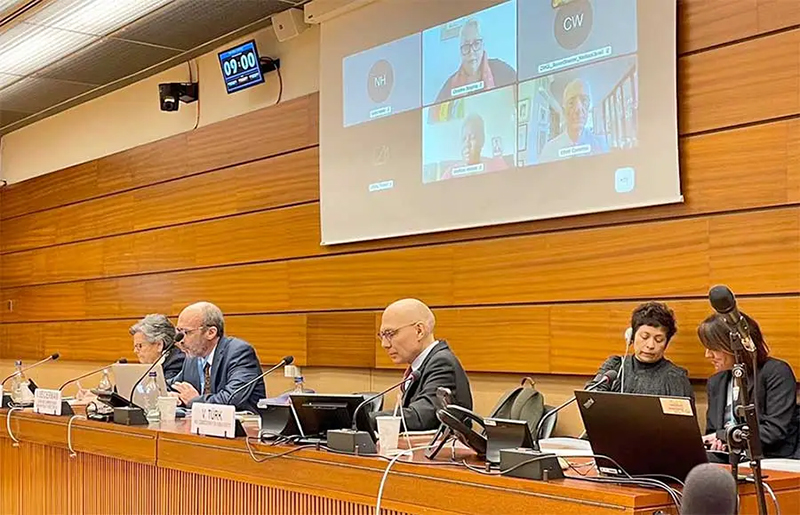In a groundbreaking report released in March, international legal professionals, backed by the United Nations, have raised the possibility that minors may be able to provide consent for sexual activities.
Titled “The 8 March Principles for a Human Rights-Based Approach to Criminal Law Proscribing Conduct Associated with Sex, Reproduction, Drug Use, HIV, Homelessness and Poverty,” this comprehensive report was meticulously drafted by the esteemed 60 members of the International Commission of Jurists and intended to serve as a beacon of legal guidance.
As stated in the report, “Composed of 60 eminent judges and lawyers from all regions of the world, the International Commission of Jurists promotes and protects human rights through the Rule of Law, by using its unique legal expertise to develop and strengthen national and international justice systems.” The report outlines several principles designed to provide a clear, accessible, and operational legal framework, as well as practical legal guidance, on crucial human rights concerns.

These principles cover a wide range of consensual sexual activities, including sex outside of marriage, same-sex sexual relations, adolescent sexual activity, and sex work, in order to ensure a holistic approach to addressing human rights in modern society.
The report emphasizes the importance of considering “adolescents’ evolving capacity to consent in certain contexts, in fact, even if not in law, when they are below the prescribed minimum age of consent in domestic law,” as a crucial factor in determining human rights law.
Furthermore, the March report was a collaborative effort, with contributions from esteemed organizations such as UNAIDS and the Office of the United Nations High Commissioner for Human Rights, underscoring its significance and credibility.
UNAIDS highlighted that the purpose of presenting new legal principles was to address the “continued overuse of criminal law by governments and in some cases arbitrary and discriminatory criminal laws,” which it claimed has resulted in “a number of human rights violations.” This further underscores the urgent need for a comprehensive and inclusive approach to human rights issues, as advocated by the report.
According to UNAIDS, the current criminal laws not only perpetuate stigma, harmful gender stereotypes, and discrimination based on gender or sexual orientation, but also contribute to human rights violations.
The report’s findings are indeed startling, suggesting that individuals classified as “adolescents” by the U.N., which includes those between 10 and 19 years old, may be able to consent to sexual activity.
Principle 16 of the report, titled “Consensual Sexual Conduct,” unequivocally asserts that certain sexual activities “may not be criminalized.”
“Consensual sexual conduct, irrespective of the type of sexual activity, the sex/gender, sexual orientation, gender identity or gender expression of the people involved or their marital status, may not be criminalized in any circumstances,” the report reads.
“Consensual same-sex, as well as consensual different-sex sexual relations, or consensual sexual relations with or between trans, non-binary and other gender-diverse people, or outside marriage – whether pre-marital or extramarital – may, therefore, never be criminalized.” These groundbreaking principles highlight the need for a progressive and inclusive approach to sexual rights and human rights, as advocated by the report.

The report emphasizes that the enforcement of criminal law related to age of consent must be applied without discrimination based on sex/gender or age of consent to marriage.
Furthermore, the report highlights that sexual conduct involving individuals below the domestically prescribed minimum age of consent to sex may be consensual in reality, even if not recognized by law. It stresses that the enforcement of criminal law should take into account the rights and capacity of individuals under 18 years of age to make decisions about engaging in consensual sexual conduct, and their right to be heard in matters concerning them.
It further asserts that individuals under 18 years of age should be able to participate in decisions affecting them, considering their age, maturity, and best interests, and with specific attention to non-discrimination guarantees, in accordance with their evolving capacities and progressive autonomy. This underscores the importance of considering the rights and agency of young individuals in matters related to sexual conduct, as outlined in the report.
“Sexual conduct involving persons below the domestically prescribed minimum age of consent to sex may be consensual in fact, if not in law.” the report states.
The report does indeed highlight the evolving capacity and rights of adolescents to make decisions about engaging in consensual sexual conduct, stating that “sexual conduct involving persons below the domestically prescribed minimum age of consent to sex may be consensual in fact, if not in law.” It further emphasizes the need for enforcement of criminal law to reflect the rights and capacity of persons under 18 years of age, with consideration given to their age, maturity, best interests, and non-discrimination guarantees.
Some individuals on Twitter expressed concerns about the definition of adolescents as individuals between 10 and 19 years old, with one user questioning how a 10-year-old can consent to something they may not fully understand. Others argued that the report did not specifically mention children engaging in sexual activity with adults, but rather highlighted that minors may choose to have sex with each other. However, another user raised concerns about potential intentional loopholes due to the vague language used in the report.



